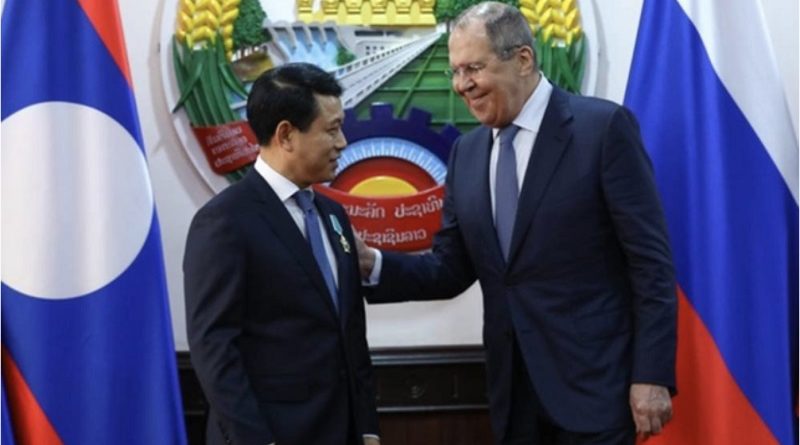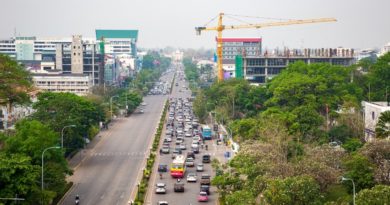Will Laos Be Sanctioned For Embracing Russia?
Source: Asia Times
The Lao government claims neutrality over the Ukraine war but its actions have left some to question its impartiality as diplomatic pressure builds on Southeast Asian nations to line up with the US and West against Russia.
“We have a clear foreign policy direction. Laos will not take sides in today’s conflicts and disputes,” Thongloun Sisoulith, Laos’ state president, said at a summit in May. Economic sanctions and embargoes “will not make our world a better place,” he added.
Laos has so far consistently failed to back UN General Assembly resolutions condemning Russia and offering moral support for the Ukrainian defenders. Neighboring Vietnam, likewise a Cold War-era ally of Moscow, has also abstained on the UN votes.
Access to Russian military equipment could be one explanation for Laos’ reticence to speak out against Russia’s invasion. Last year, news reports indicated that Russia plans to build a defense facility in Laos, a rumor that first surfaced in 2018.
In December 2020, Russian troops began helping their Lao counterparts to clear unexploded ordnance, or UXO, left over from the Vietnam War. Radio Free Asia reported that this was in an area where Russia will help build a facility, including an upgraded airport, for joint Russian and Lao military use.
Diplomatic overtures are becoming more frequent. “We are satisfied with the level of interaction with Laos as Russia’s reliable partner in Southeast Asia,” Russian President Vladimir Putin said in May of last year. Sergey Lavrov, the Russian foreign minister, visited Vientiane last July.
Interestingly, Lavrov skipped Vientiane on his brief tour of Asia this month, choosing instead to visit Hanoi on July 6, where he stated that “Vietnam is a key partner [of Russia’s] in ASEAN…and the two countries’ relations are based on history and their common fight for justice.”
Last December, Moscow provided US$12 million to upgrade the Mittaphab Hospital, one of Laos’ main hospitals. The first online Russian-Lao Business Forum was held the following month.
It’s also worth considering personal relations, said Keith Barney, associate professor at the Australian National University. Many of Laos’ top leaders were educated in the Soviet Union, including Thongloun, who is also general secretary of the communist Lao People’s Revolutionary Party.
He studied in Leningrad in 1973 and received a Master of Arts in Linguistics in 1978, Barney noted. Thongloun had another stint in 1981 at the Moscow Soviet Academy of Social Sciences, majoring in the history of international relations.

Former General Secretary Bounnhang Volachit also studied in the Society Union. “Observers would do well to pay attention to these social-political networks that maintain Lao-Russian ties,” said Barney.
“We are glad that Lao partners attach great importance to the preservation of the historical truth and rejection of any attempts to falsify the history,” the Russian ambassador to Vientiane, Vladimir Kalinin, wrote in an op-ed in the Vientiane Times on June 12, Russia’s National Day.
Asia Times’ analysis of reports by Lao state-run media shows that the Russian embassy has held at least three press conferences to brief the Lao media about the war in Ukraine since it began on February 24.
The Lao state-run news agency reliably repeated comments from Russian diplomats, including in a briefing in early May that “with the help of foreign countries, Ukraine has become a center of attraction for terrorists and mercenaries” and “The West is openly encouraging Kiev to attack Russia.”
Laos’ need for Russian oil might be another reason. In April, Moscow said it would sell oil and gas to “friendly countries…[at] any price range,” according to a Reuters report.

India, for instance, is estimated to have imported 819,000 barrels per day in May, up from 33,000 the previous year, at a steep discount from Moscow.
In early May, a notice issued by the Lao Prime Minister’s Office directed ministries to seek cheap oil from Russia, according to reports by the Laotian Times, an independent newspaper.
Russian gas is 70% cheaper than supplies from other international suppliers, and Laos is desperately short of both oil and foreign currency reserves. It has faced oil shortages since the beginning of this year, forcing consumers across the country to queue for hours or stop traveling altogether.
Laos also faces a wider economic crisis. As well as spiking oil prices, inflation reached 23% in June and the local currency, the kip, has deteriorated by almost a third against the US dollar this year, making non-Russian oil imports vastly more expensive. Worse, Laos is facing a possible debt default this year, which has added even greater pressure on the central bank to impose short-term monetary measures.
Asia Times cannot confirm whether Laos is currently importing Russian oil or has signed agreements to do so. There are questions, however, about how easily the landlocked country could access such oil imports.

This week, Lao Foreign Minister Saleumxay Kommasith also raised the possibility of buying oil from Saudi Arabia, which may suggest Vientiane is in the market for alternative oil streams.
According to Joshua Kurlantzick, senior fellow for Southeast Asia at the Council on Foreign Relations think tank, Laos could face “some modest punishment” for buying Russian fuel.
“But I don’t think the punishment will be too severe, since it would look awfully petty of major world democracies to be imposing punishments on Laos at a time when Laos’ economy is in freefall and poverty is skyrocketing,” he added.
“Many countries, both advanced and developing countries, keep energy transactions with Russia. How can the ‘Western democracies’ punish Laos?” asked Toshiro Nishizawa, a professor at the University of Tokyo’s Graduate School of Public Policy.
On the one hand, India and Vietnam — which have also taken stances on the Ukraine war that have raised certain complaints in the US and Europe— are likely too large and geopolitically-important countries for the US and West to reprimand
Punishing Laos, however, would have fewer risks. On the other hand, Laos is arguably too insignificant a geopolitical actor for Western democracies to target. The other problem, of course, is that Western democracies have few means with which they could reprimand Laos.
Unlike Vietnam, which also engaged in free-market reforms in the late 1980s, Laos has barely opened up its economy to the wider world, while its politicians have tended to remain hermetic and more focused on diplomacy with only its neighbors.
Laos’ trade in goods with the US was worth a paltry US$251 million last year, roughly 2% of its overall trade, according to US government data. Laos’ overall trade, excluding profitable energy exports, was valued at around $13 billion last year, according to data from the Lao Trade Portal.
The bilateral exchange of goods with the European Union was worth just $543 million, making the EU its fourth-largest trading partner. Trade with third-placed Vietnam was around US$1.6 billion.
As a result, Laos would hardly suffer if Western democracies attempted to reprimand its cooperation with Moscow through economic means.
“Laos faced wide international criticism over the enforced disappearance of Sombath Somphone, but these criticisms were not accompanied by any punitive economic measures,” said Kearrin Sims, a senior lecturer at the James Cook University in Australia, referring to a prominent civil society activist who went missing in 2012.
Somphone’s case was taken up by many senior foreign diplomats, including Hillary Clinton, then the US secretary of state. Many believe the outspoken Sombath was murdered by Lao authorities.

“This is not to say that Laos does not risk damaging its relationship with Western powers, but I think it is unlikely that trade sanctions or reductions in aid funding will be imposed,” said Sims.
In early March, Japanese Prime Minister Fumio Kishida held a phone call with his Laotian counterpart, Phankham Viphavanh, in which the leader appealed for “the international community to unite and take resolute actions to fully defend the very foundation of the international order,” according to a statement after the call.
An official at the Japanese embassy in Vientiane wouldn’t comment on the issue. However, the official told Asia Times that Japanese diplomats have conveyed to their Lao counterparts “that Russia’s invasion of Ukraine is an act that undermines sovereignty and territorial integrity enshrined in the ASEAN Charter and ASEAN Outlook on Indo-Pacific.”
“Japan would like to work with [Laos] so that Russia listens to the voice of the international community and stops such acts as soon as possible,” the Japanese embassy official said.
Wendy Sherman, the US deputy secretary of state, also recently met with Lao Foreign Minister Saleumxay Kommasith, where the topic of the Ukraine war was raised.
“We call upon the Government of Lao PDR to condemn Russia’s military aggression and join the international sanctions on Russia,” a statement issued by the US embassy in Vientiane in April said, referring to Laos’ by its formal name. “Ukrainian people would expect from the People of Laos to support Ukraine, provide humanitarian aid, [and] continue donations for peace.”
Peter Stano, the EU’s lead spokesperson for foreign affairs and security policy, told Asia Times that Brussels “is working towards the widest possible international condemnation and isolation of Russia by the international community.”
“When other countries enable the circumvention of the international sanctions, they are undermining efforts to stop Putin’s war machine and it will certainly be reflected in our bilateral relations,” Stano said.
“Our [Lao] relations are based on a shared commitment towards peace, security and multilateralism,” said the EU’s spokesperson. “As such, we look forward to the widest possible support of the partner countries, in joining the EU in our efforts to stop Russia’s aggression.”
He added: “The EU sanctions packages, including with regard to the import of oil, are not binding to the non-EU countries such as Laos, nor do we have any confirmation about Russian oil imports to Laos.”
More likely than repercussions from the Western democracies, there’s a danger Laos falls into Russia’s political debt — “and who knows what the payback would be,” said Kurlantzick.
“One has to wonder about the general political support that Russia seems to receive in Laos. What’s in it for Laos?” pondered Australian National University’s Barney.
Follow David Hutt on Twitter at @davidhuttjourno





